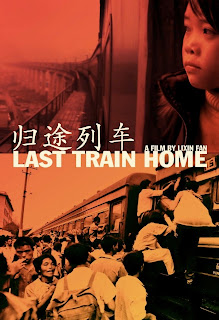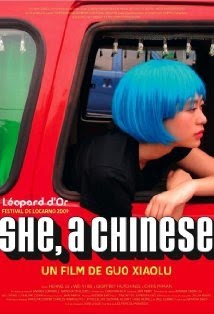
This film made me crazy. It's a good film, very well acted with some poetic dialog sprinkled throughout, but it's also some of the worst
Orientalist horror imaginable. But that's weird because it's a Japanese film, by a Japanese director, based on a short story by a
Japanese writer. "Villon's Wife" is the name of the story the film is based upon, and the film is about a wife but there's nobody named Villon in it. If you run the Japanese sub-title, 〜桜桃とタンポポ〜, through
Google translation it returns "
Cherry and dandelion", which might seem a little abstract but it has a lot more to do with the movie than "Villon's Wife" and actually takes a bit of the sting out of what comes off as the debatable center of attention and refocuses it on what really matters.
On the surface this is a film of questionable merit about a long-suffering and loyal wife, named Sachi, to a cheating, thieving, alcoholic husband named Otani. They have a two year old child. Otani is a writer and an attempt is made to give his awful ways a pass by portraying them as
self-destructive in that poetic way only artists can be, and be loved. He characterizes the owners of a local pub, where
Sachi is working to pay off his debt, as "mercenaries" who feed him liquor so they can profit off him. That's the twisted logic of a drunk. He says things like "Distant yet close, are man and woman", and "Women know neither joy nor grief ... men know only grief. They are always fighting fear". Goodness.
Which brings us to cherries and dandelions. Otani has written a dandelion story about "a dandelion's sincerity". The story moved a young factory worker named Okada so deeply he begins stalking Otani but meets and falls in love with Sachi instead, quickly sussing Otani's ill-treatment of her. Over drinks with this would be suitor to his wife Otani, as a self-reflective woe-is-me justification for his abuse of Sachi, says "I can't even love a dandelion the way I should. I want to pluck its petals, scrunch it in my fist ... stick it in my mouth..." Otani is suspicious of the relationship between his wife and the factory worker and, feeling like a cuckold, meets with one of his lovers, portrayed as equally self-destructive (somehow, as a woman she is able to feel grief too, I guess), and they attempt suicide together. They fail. Sachi dutifully hires a lawyer, an old flame who is still in love with her, to defend Otani who is charged with the attempted murder of the girl. Sachi doesn't have any money and might have slept with the lawyer as payment.
The film ends with Sachi trying to mend things with Otani who is eating cherries that were given to him to give to his son. He acknowledges he is a terrible father. Sachi eats one of the cherries, says they are good and tells her husband that "Being a monster is fine. As long as at least we're alive, it's just fine." I wanted to pull my hair out.
Japanese sexism may not be peculiar but it is certainly intense and complex. On first blush,
Villon's Wife seems to be one big stereotype celebrating the loyal, subservient, and beautiful Japanese woman. And props must be given to
Takako Matsu who plays Sachi. She is beautiful, beaming that stereotype loud and clear. Everyone in the film is portrayed as loving her. She is so radiant it might be hard to take your eyes off her and see what else is going on in the film.
Villon's Wife is a period piece set in the late 1940s and all the characters seem self-destructive. The Japanese have lost the war and GI Joe is everywhere. When Sachi goes to meet with the lawyer who helped her husband, she first approaches a woman on the street who is applying red lipstick to entice GI Joe, and says "Please sell me your lipstick". The woman replies "A Yankee gave it to me. It's American." Sachi makes the woman an offer she can't refuse, applies the lipstick and goes in to see the lawyer. When she comes out, her hair ever so slightly disheveled, she sees the lipstick woman in the back of a Jeep with a few other women and a bunch of GI Joes. The woman is waving and saying "Good bye. Good bye". At first Sachi seems confused, but eventually smiles and returns the "Good bye". She sets the lipstick down in the grass and, with an apparent sense of shame (or empowerment?), wipes her hand across her lips.
I don't really know for sure if this film is that smart and subtle, but if it's not, it's awful. I can't even say for sure what exactly the film is exploring or trying to say. It would help if I were Japanese, I think, and had read the source material but that kind of movie going is for college students. I can say that
Villon's Wife presents itself as being a whole lot more than a simple character study of an abused but loyal wife. I blame the chosen English title for throwing me off. All of the performances are outstanding.
Takako Matsu is brilliant and beautiful as Sachi.
Asano Tadanobu was born to play the role of Otani and
Ryoko Hirosue is wonderful in her bit part as his partner in the attempted Love-Suicide. All the characters are good and the film looks great. I'm not so creeped out any more, but be warned: watching this film at face value is a little troubling. If you don't look for deeper meaning it might not appeal.
★★★★
Director:
Kichitaro Negishi
Starring:
Takako Matsu,
Asano Tadanobu,
Ryoko Hirosue, Shigeru Muroi, Masatô Ibu
IMDb 7.7 (58 votes)


















